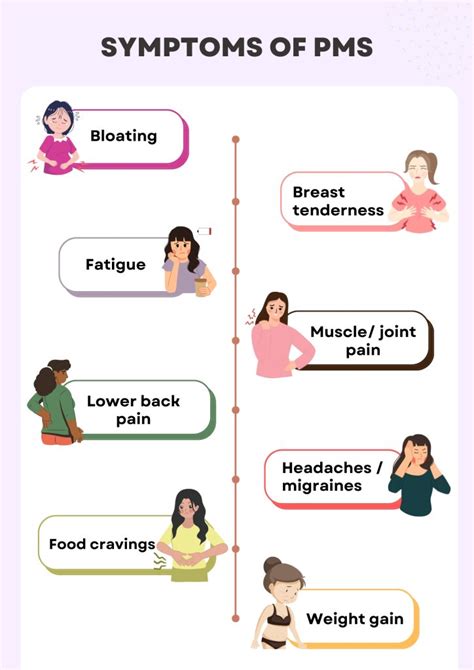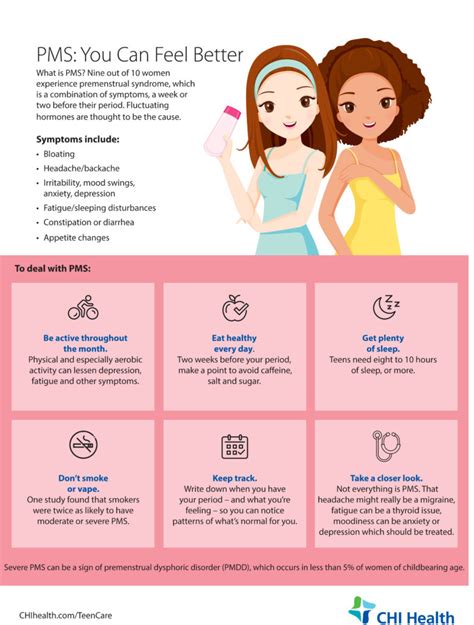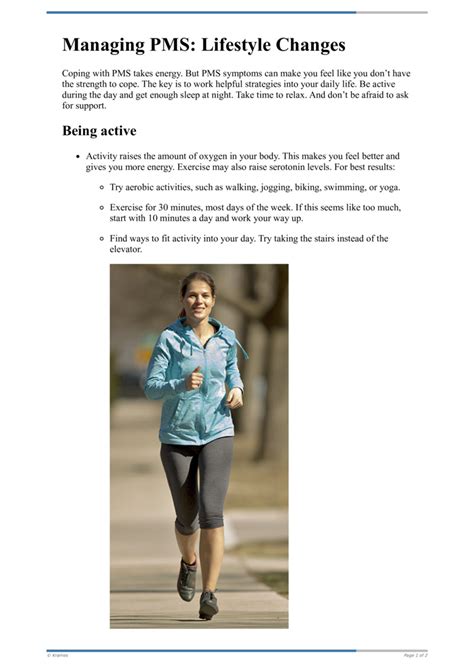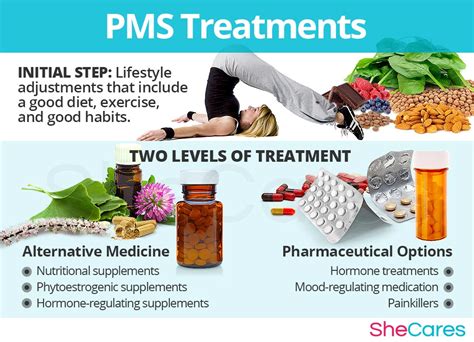Intro
Premenstrual syndrome, commonly referred to as PMS, is a condition that affects many women of reproductive age. It is characterized by a range of physical, emotional, and behavioral symptoms that occur in the premenstrual phase of a woman's menstrual cycle. The timing of when PMS starts can vary from woman to woman, but it typically begins after ovulation and can last until the start of menstruation.
For most women, PMS symptoms start to appear around 7-10 days before the onset of their period. However, the exact timing can depend on various factors, including the length of the menstrual cycle, hormonal fluctuations, and individual differences in sensitivity to hormonal changes. Some women may experience symptoms earlier or later in their cycle, and the severity of symptoms can also vary from month to month.
The symptoms of PMS can be mild, moderate, or severe, and may include mood swings, bloating, breast tenderness, headaches, and changes in appetite or sleep patterns. While the exact causes of PMS are not fully understood, it is believed to be related to the drop in estrogen and progesterone levels that occurs after ovulation. This hormonal shift can affect neurotransmitters, such as serotonin and dopamine, which play a role in mood regulation, appetite, and sleep.
Understanding PMS Symptoms

PMS symptoms can be categorized into physical, emotional, and behavioral symptoms. Physical symptoms may include bloating, breast tenderness, headaches, and changes in bowel movements. Emotional symptoms can range from mood swings and irritability to anxiety and depression. Behavioral symptoms may include changes in appetite, sleep patterns, and social withdrawal.
Physical Symptoms of PMS
Physical symptoms of PMS can be uncomfortable and may interfere with daily activities. Some common physical symptoms include: * Bloating and water retention * Breast tenderness or swelling * Headaches or migraines * Changes in bowel movements, such as constipation or diarrhea * Fatigue or low energy * Changes in sleep patterns, such as insomnia or excessive sleepinessCauses and Risk Factors of PMS

While the exact causes of PMS are not fully understood, several factors are believed to contribute to its development. These include:
- Hormonal fluctuations: The drop in estrogen and progesterone levels after ovulation can affect neurotransmitters and contribute to PMS symptoms.
- Genetic predisposition: Women with a family history of PMS or other mood disorders may be more likely to experience PMS symptoms.
- Stress: High levels of stress can exacerbate PMS symptoms and make them more severe.
- Lifestyle factors: Poor diet, lack of exercise, and inadequate sleep can contribute to PMS symptoms.
Treatment and Management of PMS
Treatment and management of PMS typically involve a combination of lifestyle changes, nutritional supplements, and medication. Some effective strategies for managing PMS symptoms include: * Keeping a symptom journal to track symptoms and identify patterns * Engaging in regular exercise, such as yoga or walking * Practicing stress-reducing techniques, such as meditation or deep breathing * Getting enough sleep and maintaining a consistent sleep schedule * Eating a balanced diet that includes plenty of fruits, vegetables, and whole grainsLifestyle Changes for Managing PMS

Making lifestyle changes can help alleviate PMS symptoms and improve overall health. Some key changes to consider include:
- Eating a diet rich in omega-3 fatty acids, such as salmon and flaxseeds
- Avoiding trigger foods, such as caffeine, sugar, and processed meats
- Staying hydrated by drinking plenty of water
- Getting regular exercise, such as walking or swimming
- Practicing stress-reducing techniques, such as yoga or meditation
Nutritional Supplements for PMS
Certain nutritional supplements may help alleviate PMS symptoms. These include: * Calcium: Can help reduce symptoms of bloating and water retention * Vitamin B6: May help reduce symptoms of anxiety and depression * Magnesium: Can help reduce symptoms of cramps and headaches * Omega-3 fatty acids: May help reduce inflammation and improve moodMedical Treatment Options for PMS

In some cases, medical treatment may be necessary to manage PMS symptoms. Treatment options may include:
- Birth control pills: Can help regulate hormonal fluctuations and reduce symptoms
- Antidepressants: May help reduce symptoms of anxiety and depression
- Anti-anxiety medications: Can help reduce symptoms of anxiety and panic attacks
- Pain relievers: May help reduce symptoms of headaches and cramps
Alternative Therapies for PMS
Alternative therapies, such as acupuncture and herbal supplements, may also be effective in managing PMS symptoms. Some popular alternative therapies include: * Acupuncture: May help reduce symptoms of pain and inflammation * Herbal supplements, such as chasteberry and evening primrose oil: May help reduce symptoms of anxiety and depression * Aromatherapy: May help reduce symptoms of stress and anxiety * Massage therapy: Can help reduce symptoms of tension and stressConclusion and Next Steps

In conclusion, PMS is a common condition that affects many women of reproductive age. While the exact causes of PMS are not fully understood, it is believed to be related to hormonal fluctuations and individual differences in sensitivity to hormonal changes. By making lifestyle changes, using nutritional supplements, and seeking medical treatment when necessary, women can effectively manage their PMS symptoms and improve their overall health and well-being.
We invite you to share your experiences and tips for managing PMS symptoms in the comments below. If you found this article helpful, please share it with your friends and family who may be experiencing PMS symptoms. Together, we can raise awareness and support for women's health and wellness.
What are the most common symptoms of PMS?
+The most common symptoms of PMS include mood swings, bloating, breast tenderness, headaches, and changes in appetite or sleep patterns.
How can I manage my PMS symptoms?
+You can manage your PMS symptoms by making lifestyle changes, such as eating a balanced diet, exercising regularly, and practicing stress-reducing techniques. You can also consider using nutritional supplements, such as calcium and vitamin B6, and seeking medical treatment when necessary.
Can PMS be cured?
+While PMS cannot be cured, its symptoms can be effectively managed with lifestyle changes, nutritional supplements, and medical treatment. By working with a healthcare provider and making healthy lifestyle choices, women can reduce their PMS symptoms and improve their overall health and well-being.
How long do PMS symptoms last?
+PMS symptoms typically start to appear around 7-10 days before the onset of menstruation and can last until the start of the period. However, the exact duration of PMS symptoms can vary from woman to woman and may depend on individual factors, such as hormonal fluctuations and lifestyle choices.
Can PMS affect my daily life?
+Yes, PMS can affect your daily life, particularly if your symptoms are severe. However, by managing your symptoms and making healthy lifestyle choices, you can reduce the impact of PMS on your daily life and improve your overall health and well-being.
